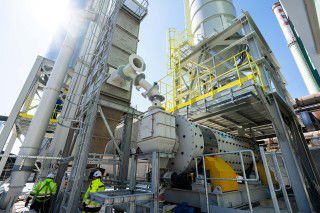With the new name of Semen Indonesia Group (SIG) and a new logo, PT Semen Indonesia announced this week a radical change for the company that will reinforce its transformation into a complete provider of building material solutions.
The changes are seen as a way to address the growing needs of customers. The logo change is part of the company's transformation to build a sustainable life for future generations. SIG is focussed on developing innovations to answer the challenges of building materials and provide solutions to all stakeholders.
SIG President Director, Hendi Prio Santoso, said: "The company wants to be at the forefront in providing innovative, latest and value-added building material solutions in the regional area."
In addition, the company is diversifying to be prepared for the challenges brought by an anticipated oversupply of cement and its own business expansion.
Besides its expansion plans, SIG wants to become a complete building materials supplier. "Then we are more economical," said Doddy Sulasmono, CFO at SIG.
Growth by acquisition
The company has sought to forge a new beginning after its merger with PT Solusi Bangun Indonesia Tbk (formerly Holcim Indonesia) in January 2019 and having operated with three different state companies (Semen Gresik, Semen Padang and Semen Tonasa). The Indonesian government still owns 51.01 per cent of SIG with 48.99 per cent of the share capital being in public hands.
The cement producer is now firmly established as the lead player in Indonesia's cement market with nine integrated domestic cement plants, four domestic grinding stations and one plant in Vietnam with a total group cement capacity of 53Mta. SIG's cement market share in the domestic market is now estimated at 55.1 per cent, according to the Indonesian cement association, ASI.
The acquisition of PT Solusi Bangun Indonesia Tbk, including the integrated plants at Tuban, Narogong, Cilacap and Lhok Nga and the grinding plants at Kuala Indah and Ciwandan, plus a terminal at Lampung, had an implied enterprise value/capacity of US$117/t. This price is significantly lower than the price of building greenfield cement plants in Indonesia, which is estimated at US$150-180/t, according to BINA ARTHA Sekuritas.
SIG also recently announced its intention to build a greenfield cement plant in Myanmar with 0.8Mta of capacity.
January sales volumes
SIG's total cement sales volume (excluding SBI) in January 2020 advanced by 34.5 per cent to 3.357Mt from 2.496Mt in January 2019.
Of this total, Semen Indonesia's cement sales volume in January 2020 reached 2.088Mt compared with 1.246Mt in January 2018, representing a fall of -2.7 per cent. However, export volumes rose 19.8 per cent to 0.253Mt in January 2020, up from 0.211Mt in January 2019.
The Thang Long Cement subsidiary, in Vietnam, recorded domestic cement volumes of 72,715t in January 2020, compared to 80,198t in January 2019, down -9.3 per cent. Thang Long Cement exported 99,978t of cement in January 2020, up 71.8 per cent from the exports of 58,200t in January 2019.
Meanwhile, PT Solusi Bangun Indonesia Tbk saw its domestic cement sales in January 2020 reach 0.775Mt, down from 0.905Mt in January 2019, a decline of -14.3 per cent. The subsidiary's exports of cement in January 2020 totalled 69,219t, up by 89 per cent from the 36,620t sold in January 2019.
